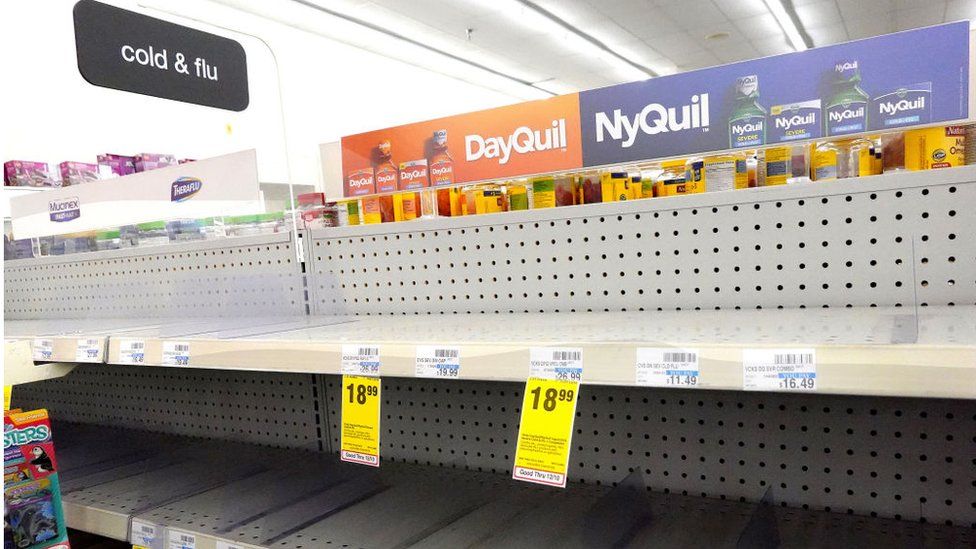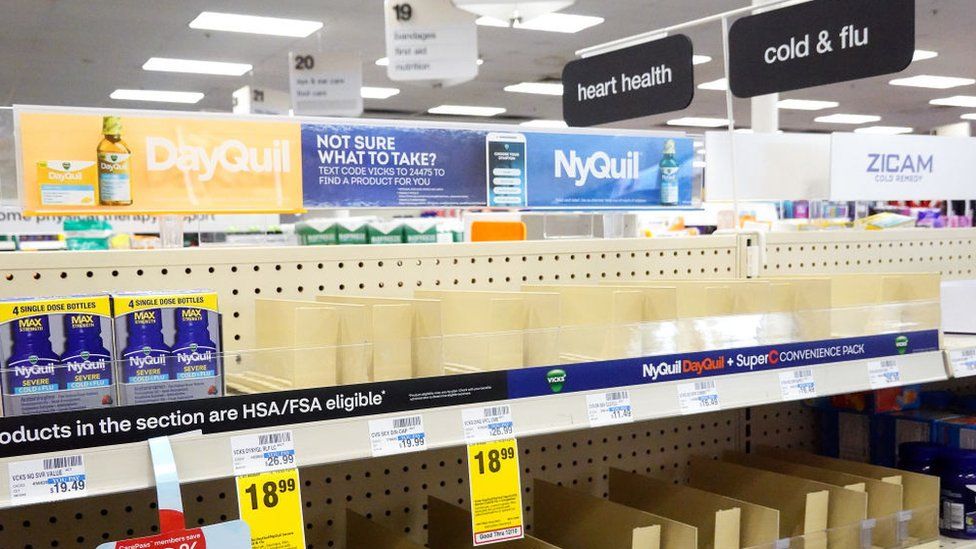
A severe season of cold and flu is leading to empty pharmacy shelves and thinning supplies of antibiotics in the US and other parts of the world.
Parents are struggling to find children's versions of over-the-counter medicines like Ibuprofen and Tylenol as well as the antibiotic Amoxicillin.
Some major pharmacies are limiting customers' purchases to ensure everyone has access to the drugs.
But there are a number of strategies for parents looking for help.
Hillary Dalfonso, a mother to a toddler, wanted to take action after she learned her sick friend had to travel to four different stores in town to track down medication for her ill child.
She started a Facebook group where parents could share posts highlighting which stores have the products in stock. She said she was inspired by such groups that popped up during the recent infant formula shortage in the US.
"I'm hoping this group can do the same for parents to prevent the stress of running around, using gas while it's expensive and [losing] valuable time" when dealing with a sick child, she said.
Why is there a shortage of children's Tylenol?
This drug shortage is unusual, experts say.
"In most seasons, it is rare to experience shortages of these medications, especially as widespread as this," said Brandon Dionne, an associate clinical professor at Northeastern University School of Pharmacy in Boston, Massachusetts.
Globally, countries have been battling an earlier and severe season of viruses, including the flu and respiratory syncytial virus (RSV), which can be dangerous for young children.
The illnesses have overwhelmed children's hospitals.
Supplies were prepped to keep up with previous winter seasons, but the uptick in illnesses earlier in the season meant manufacturers fell behind, said Stephen Schondelmeyer, a professor in the University of Minnesota College of Pharmacy.
Johnson & Johnson, which makes Children's Tylenol and Children's Motrin, told the BBC the company has not been experiencing widespread shortages of the products, but that they may be less readily available due to consumer demand caused by a difficult virus season. The company is maximising production capacity, a spokesperson said.
The antibiotic Amoxicillin has been affected by the sickness season as well. Though Amoxicillin does not treat viruses, respiratory illnesses have caused an increase in secondary infections that the drug can treat.
What are pharmacies doing about the shortage?
Fearing the shortage, some parents are hoarding over-the-counter medications, which experts say they should never do, as it makes the problem worse.
CVS Pharmacy told the BBC it has had to limit each customer to two children's pain relief products to help ensure access to the drugs, while Walgreens said it has restricted online customers to six over-the-counter paediatric fever reducers.
Dr Schondelmeyer said drug makers are beginning to catch up to market demands, but short supplies could persist for up to another month.
Who is affected by the medication shortage?
The US, Canada and parts of Europe are all dealing with children's medication shortages.
More than a dozen states in the US had "very high" levels of respiratory illnesses last week, according to the US Centers for Disease Control and Prevention.
The southern states of Florida, Alabama and Mississippi as well as some states on the east coast, including Washington, DC, Virginia and North Carolina, have been hit hard by shortages, Dr Schondelmeyer says.
What can parents do this cold and flu season?
Public health experts say Americans should stay up to date on Covid-19 and flu shots to avoid respiratory infections.
Parents should avoid giving children cold medicines besides Tylenol and Ibuprofen because they do not work well, said Sean O'Leary, chairman of the Committee on Infectious Diseases at the American Academy of Pediatrics.
Parents can use other methods to make their children more comfortable, he said, including salt water nasal sprays and humidifiers for stuffy noses.

If parents struggle to find children's Tylenol and Ibuprofen for their children at the pharmacy, they should consult the pharmacist about other options, said Dr Schondelmeyer.
Pharmacists can instruct parents on how to cut and crush adult dosage fever and pain relievers into child doses, but parents should never attempt to do this on their own.
Health - Latest - Google News
December 22, 2022 at 06:48AM
https://ift.tt/h2niyFa
Children's Tylenol in short supply - here's what parents can do - BBC
Health - Latest - Google News
https://ift.tt/JLxNaPQ

No comments:
Post a Comment